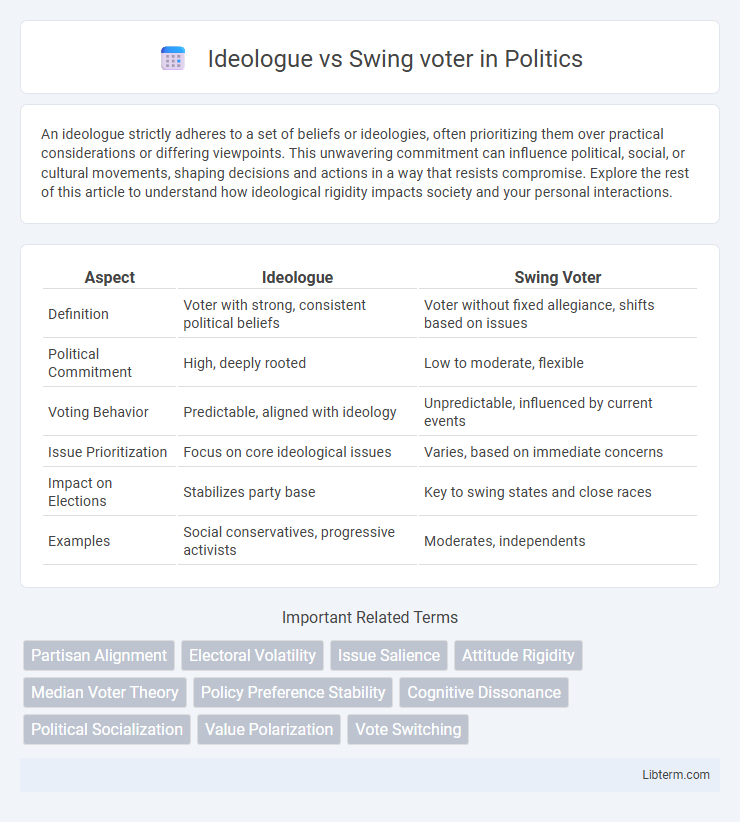An ideologue strictly adheres to a set of beliefs or ideologies, often prioritizing them over practical considerations or differing viewpoints. This unwavering commitment can influence political, social, or cultural movements, shaping decisions and actions in a way that resists compromise. Explore the rest of this article to understand how ideological rigidity impacts society and your personal interactions.
Table of Comparison
| Aspect | Ideologue | Swing Voter |
|---|---|---|
| Definition | Voter with strong, consistent political beliefs | Voter without fixed allegiance, shifts based on issues |
| Political Commitment | High, deeply rooted | Low to moderate, flexible |
| Voting Behavior | Predictable, aligned with ideology | Unpredictable, influenced by current events |
| Issue Prioritization | Focus on core ideological issues | Varies, based on immediate concerns |
| Impact on Elections | Stabilizes party base | Key to swing states and close races |
| Examples | Social conservatives, progressive activists | Moderates, independents |
Understanding Ideologues: Definition and Characteristics
Ideologues are voters who prioritize a consistent set of political beliefs and principles, often aligning strongly with a specific ideology such as liberalism, conservatism, or socialism. Their voting behavior is guided by deep conviction and ideological coherence, making them less susceptible to changing their preferences based on individual candidates or specific issues. This contrasts with swing voters, who tend to evaluate candidates more pragmatically and are more likely to shift voting decisions between elections based on current events or campaign dynamics.
Who Are Swing Voters? Key Traits and Behavior
Swing voters are individuals who do not have a consistent partisan allegiance and tend to vote based on current issues, candidate appeal, or specific policies rather than party loyalty. Key traits of swing voters include political independence, openness to persuasion, and a tendency to evaluate candidates on performance and positions rather than ideology. Their behavior is characterized by fluctuating voting patterns in different elections, making them critical targets for campaign strategies and electoral outcomes.
Ideologues vs Swing Voters: Fundamental Differences
Ideologues are individuals who hold strong, consistent political beliefs often aligned with a specific ideology, enabling them to interpret political events through a coherent framework. Swing voters, in contrast, lack fixed partisan loyalty and may shift their support between parties based on current issues, candidate appeal, or campaign messages. This fundamental difference impacts electoral strategies, as ideologues provide predictable base support while swing voters represent pivotal, uncertain blocks critical in tight elections.
The Role of Ideologues in Shaping Political Movements
Ideologues play a crucial role in shaping political movements by providing consistent and deeply held beliefs that guide collective action and policy advocacy. Their unwavering commitment to core principles helps mobilize supporters, influence party platforms, and sustain long-term political goals. Unlike swing voters, who may shift allegiances based on short-term issues or candidate appeal, ideologues anchor movements with ideological clarity and strategic direction.
Swing Voters: Decisive Power in Elections
Swing voters hold decisive power in elections by shifting their support between candidates or parties based on current issues, rather than fixed ideological beliefs. Their voting behavior can tip the balance in closely contested races, making them the primary target of campaign strategies aiming to influence undecided or moderate electorates. Understanding the priorities and concerns of swing voters is critical for predicting election outcomes and crafting effective political messages.
Historical Impact: Ideologues and Swing Voters in Elections
Ideologues have historically shaped election outcomes by consistently supporting candidates and policies aligned with their deeply held beliefs, often solidifying party bases and driving policy direction. Swing voters, by contrast, play a pivotal role in closely contested elections by shifting their preferences based on current issues, candidate appeal, or economic conditions, thus often determining the final result in battleground states. The dynamic interplay between ideologues' steadfast loyalty and swing voters' fluctuating support has significantly influenced key historical elections and the evolution of party strategies in democracies worldwide.
Campaign Strategies: Targeting Ideologues vs Swing Voters
Campaign strategies targeting ideologues emphasize reinforcing core beliefs through issue-driven messaging and mobilization efforts, leveraging strong partisan loyalty to secure unwavering support. Swing voter campaigns prioritize persuasive communication and tailored policy proposals, aiming to convert undecided or moderate voters by addressing key concerns and highlighting candidate pragmatism. Data analytics and micro-targeting play crucial roles in identifying swing voter segments, while grassroots and digital outreach efforts solidify ideologue engagement.
Media Influence on Ideologues and Swing Voters
Media influence shapes ideologues by reinforcing preexisting beliefs through targeted content, creating echo chambers that deepen political polarization. Swing voters receive broader, varied media messages that can sway their decisions due to less rigid partisan commitments. Understanding these dynamics helps explain voting behavior and the strategic use of media in election campaigns.
Challenges in Appealing to Both Groups
Appealing to ideologues requires messaging that aligns with strong ideological principles and emphasizes policy consistency, while swing voters seek moderate, pragmatic, and flexible positions that address immediate concerns without alienating centrist views. Campaign strategies face the challenge of balancing ideological purity with broad appeal, as too much focus on one group risks disenfranchising the other, leading to polarized or diluted messages. Understanding voter segmentation and tailoring policy communication are essential to navigate the competing demands of deeply committed ideologues and undecided or moderate swing voters.
Implications for Democracy: Balancing Ideology and Flexibility
Balancing ideology and flexibility is critical for a healthy democracy, as ideologues provide consistent policy direction while swing voters drive electoral competitiveness and responsiveness. Ideologues reinforce party platforms and sustain political polarization, yet swing voters encourage compromise and adaptability in governance. The interplay between these voter types influences democratic stability by ensuring both firm principles and practical consensus.
Ideologue Infographic

 libterm.com
libterm.com